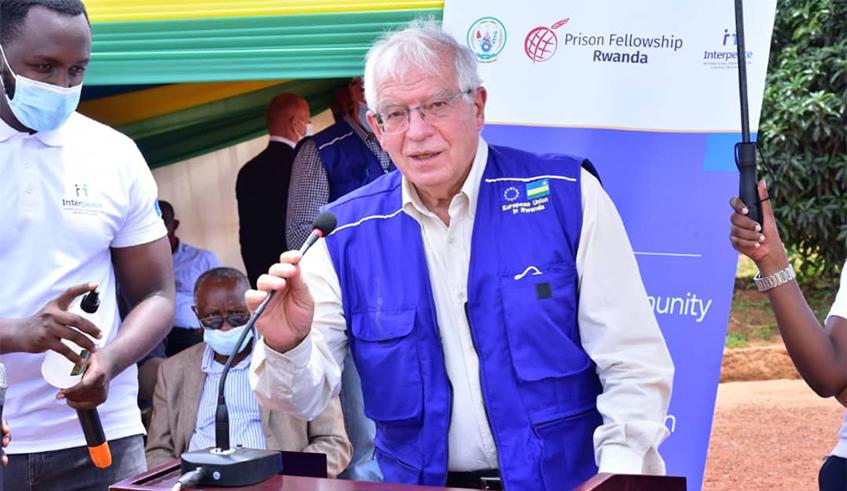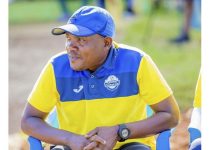Africa-Press – Rwanda. The European Union High Representative and European Commission Vice-President Joseph Borrell has commended the efforts deployed to reinforcing community capacity for social cohesion and reconciliation through societal trauma healing, a pilot programme that is being implemented by Interpeace in partnership with Prison Fellowship Rwanda with funding from the European Union.
He said this at the graduation event of 480 ‘learners’ made up of genocide survivors and former genocide perpetrators from 15 sectors of Bugesera district.
The teams graduated on Monday, October 25 after completing a 15-weeks comprehensive psychosocial healing program, dubbed “Mvura nkuvure” loosely translated as “Let us heal each other”.
After listening to the testimonies of survivors who have reconciled with former perpetrators, Borell said that the experience he had realized is enormous in his experience.
The EU commission Vice president, Spain national also said that his country has suffered almost the same tragedies, but taking steps to reconcile has been very challenging.
“From the bottom of my heart, I would like to tell you that what you are doing (reconciling) is an extraordinary initiative surpassing the normal human being experience. In my country, there were civil wars, but such an effort can’t be found there,” he said.
In Europe, we have also suffered civil wars, committed genocide and initiated slavery, he recalls, but some people still look at their fellow countrymen in the mirrors of the past mistakes.
“But we can’t develop peaceful societies if we keep blaming people of what happened in the past,” emphasized the EU high representative.
We need to take a different path of unity and reconciliation based on memorial activities to move on, he noted. He publicly apologized to the Rwandan community that, as the international community, they failed to prevent the genocide against the Tutsi, failing to protect those who were in danger.
Having been launched in October 2020, this programme has addressed the invisible but deeply felt wounds, and complemented the progress already made by the government of Rwanda towards trauma healing, social cohesion and improved livelihoods.
International Organization for Peacebuilding (Interpeace) implements the programme in partnership with Prison Fellowship Rwanda, the Ministry of Health, Rwanda Correction Service and the Ministry of Unity and Civic Engagement among others.
Bishop John Rucyahana, Chairman of Prison Fellowship Rwanda explained that this initiative was created to find a solution to heal wounds of the population with them being engaged in the process.
Bishop John Rucyahana legal representative of Prison Fellowship Rwanda speaking during the event
“We established this initiative to make sure those who have wounds in the past can heal between themselves (survivors and former perpetrators) and you have heard from the testimonies that they are mentally recovering and working together to develop themselves leaving behind the past,” commented Rucyahana.
Over one million people in Rwanda suffer from mental illnesses, exacerbated by the 1994 genocide against the Tutsi. During his remarks, the Interpeace president, Scott Weber brought in a new rising aspect, intergeneration trauma, which he cited as a challenge.
“At the beginning, we didn’t anticipate much of intergenerational trauma for young people who didn’t live through the genocide of the 1994 genocide against the Tutsi, he said.
This implies, he explains, there’s work to be done across generations with young people in schools and communities noting that these young people who are feeling and living these traumas will take them in their adulthood and further transmit it to the next generation, if nothing is done.
Through Mvura Nkuvure, survivors and perpetrators have reconciled
Legacies of the 1994 violence had a profound impact affecting social development, and brains behind this initiative thought that sustainable healing, mental health and psychosocial support was needed in efforts to build economic independence and livelihoods for the affected.
More developments to this initiative are popping: a new funding agreement between the Swedish embassy and Interpeace to expand the program to five other districts of the country is expected soon. Delegations from Burundi, Sudan and Somalia are expected to visit Rwanda and learn from the initiative to induct theirs in the respective regions.
Monica Tuyishime a graduate of Mvura Nkuvure program who lost her five children and husband during the genocide
Not only words
The graduates of the program are not only supported in mental health, but they are also financially facilitated to run businesses so as to avoid an idle mind that flashes back in the past.
Ahead of the graduation event, beekeeping equipments worth 5.3 million Rwandan francs were donated to support the collaborative livelihood initiative (bee-keeping project) of Rweru reconciliatio
For More News And Analysis About Rwanda Follow Africa-Press






